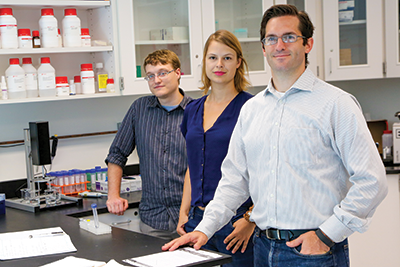How NanoBio Systems is using Desich SMART Commercialization Center equipment and the help of LCCC interns to commercialize its technology
 To measure glucose levels, those with diabetes must suffer the frequent – and painful – finger pricks required of most home monitors.
To measure glucose levels, those with diabetes must suffer the frequent – and painful – finger pricks required of most home monitors.
But NanoBio Systems is trying to change that. This small diagnostics company with a big goal of revolutionizing glucose monitoring for diabetics is partnering with Lorain County Community College to commercialize its innovative technology. The goal is to bring to market saliva glucose sensors to replace the current method of testing glucose levels.
“Saliva closely mimics everything in blood but is just more dilute,” says Michael A. Bruckman, Ph.D., director of research and engineering at NanoBio Systems. “It’s a huge market with huge interest. There’s a lot of potential and growth for companies like ours.”
Facilitating growth
NanoBio Systems is using LCCC’s Richard Desich SMART Commercialization Center space and equipment to perform its data-collection processes, and two LCCC student interns are performing vital tasks in the company’s push toward U.S. Food and Drug Administration approval.
“It’s worked out well,” Bruckman said of the relationship with LCCC. “And we’re pretty excited about the pathway forward.”
NanoBio Systems got its start in 2011 in Boston, when CEO Seyamak Keyghobad sponsored research at a Northeastern University lab to perform early development of the technology. As the technology progressed, Keyghobad looked for a more commercialized setting to house research and development of the glucose sensors.
As a graduate of Case Western Reserve University, Keyghobad had Cleveland connections, and he found his way to Matt Apanius, director of SMART Microsystems, a company that creates solutions for microelectronic package assembly challenges and is housed in the Deisch SMART Commercaization Center.
“The community college offered a lot of good resources and amenities for what they were charging, compared to anything offered in Boston,” Bruckman says.
Bruckman, who joined NanoBio Systems around the time it moved to LCCC in 2015, says the lab and office space has been ideal. But so, too, has the proximity of Great Lakes Innovation & Development Enterprise, (GLIDE), located on the LCCC campus, where Entrepreneurs-in-Residence provide business assistance to companies at every stage of development.
“I use the mentorship services offered through GLIDE to troubleshoot our business plan and talk about the direction we’re heading, so having GLIDE right downstairs has been really helpful,” Bruckman says.
NanoBio Systems also has benefitted from the work of two LCCC students – Kraig Holler and Elizabeth Muska. Holler is a Student in the Microelectromechanical Systems (MEMS) program who has assisted with the sensor manufacturing and lab testing, while Muska is a nursing student who will be the point person for collecting saliva samples.
For a company with just three employees – Bruckman, a full-time junior scientist, and a part-time senior scientist – the work the student interns do is invaluable.
“They seem to be really appreciating and enjoying the experience,” Bruckman said. “We’re still a very small company, so they’re getting high-level updates whenever we see them.”
The process of collecting enough accurate data to obtain FDA approval is long and arduous, and NanoBio Systems is still several years away from marketing its devices.
The goal is to one day use SMART Microsystems to complete small-scale manufacturing of the sensors and, if the product is as successful as hoped, proving the process can be scaled. If and when that happens, the company could be sold to a firm with larger manufacturing capabilities.
Going forward
Already, NanoBio Systems benefits from the space, advice and labor pool provided by its landlord. Eventually, if and when the company graduates to the sales side of the spectrum, there is potential for the partnership to expand.
“We could potentially use some of the advertisement and sales services offered through the Desich Business and Entrepreneurship Center,” Bruckman says.
That’s the long-term outlook. For now, the company operates humbly and hopefully, confident that its research into the capabilities of saliva testing can expand its reach beyond the realm of diabetes.
“Noninvasive glucose testing is a very big market, but I’m really excited about the potential for areas outside of that,” Bruckman says. “There is a wide variety of other biomedical markers that can monitor your general health. Our technology seems flexible enough that we can enter into different markets relatively smoothly with the application of enough physical force and energy.”
It’s possible that saliva could one day be used to detect such diseases as the Zika virus, the human immunodeficiency virus (HIV) or something as common as the influenza virus.
That’s what makes the work being done by NanoBio Systems so fascinating and the LCCC partnership so fruitful. This is a small company with big goals that, through the resources available at LCCC, is getting a big boost.
This article, written by Anthony Castrovince, originally appeared in Impact magazine.


